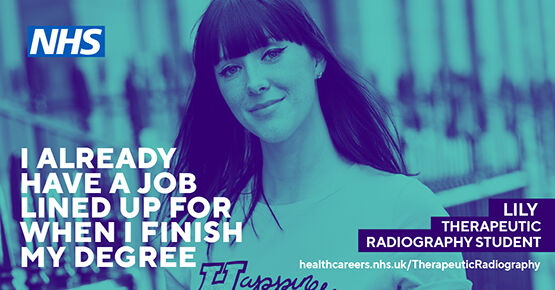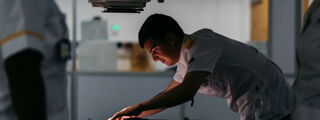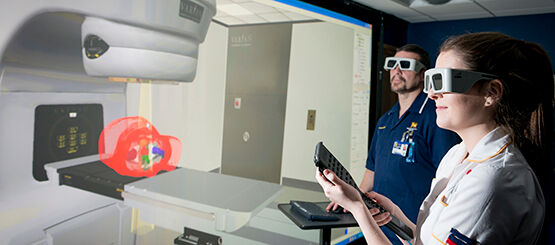Our recent Radiotherapy graduate, Lily Aston, explains what makes radiotherapy such an interesting and rewarding career. She is also the face of Health Education England to promote working within the NHS.
1. We are so much more than just professional button pushers
There’s a bit of a joke amongst the NHS that radiographers are ‘button pushers’. Although our role does involve a few buttons, as a student we have three years of training in oncology, anatomy, physics, radiation equipment and more.
As a qualified therapeutic radiographer, we can do anything from planning a patient’s radiotherapy treatment to researching new techniques for treating cancer. More importantly, we care for the patients we treat at what is possibly one of the hardest times of their life, providing compassion, empathy and world class cancer treatments.
2. Working in a cancer centre isn't what you'd expect
When people ask what you do, most of the time they assume that working with cancer patients must be a draining and depressing job. However, cancer departments are surprisingly cheerful places to be. Everyone there has the same end goal, and the long treatment periods (anything from three to seven weeks) means that by the time a patient has finished their radiotherapy, it feels like you are saying goodbye to a friend.
Of course, there are those occasions where seeing a patient in pain or having a rough time with their treatment can get tough, but mostly, people are happy to be there knowing you are helping them get through it all.

3. Career progression is a big thing
Advanced practitioner, pre-treatment radiographer, planning radiographer, review radiographer, research radiographer, prescribing radiographer…these are just a few ways you can progress, and that’s just within departments. There are also research programmes, Masters and PhD’s all aimed at therapeutic radiographers. You can end up working through charities such as Macmillan or Cancer Research, as well as conducting your own research within departments. There is a whole world of opportunity for qualified therapeutic radiographers out there!
4. Radiotherapy can take you a lot of places (geographically)
Radiotherapy is one of those things where it’s similar all over the world. Care pathways and treatment techniques may differ, but a linear accelerator will always be the same in what it does. It should be no surprise then that therapeutic radiography can open a lot of geographical doors, not just when you qualify.
Radiotherapy students at BCU get the chance to work in Canada as part of their second-year placements and in third year you get two weeks of elective placement where you can go anywhere in the world. This year, there are students going to New Zealand, Australia and the Caribbean as well as centres all over the UK. If you decide you are suited to warmer climes, when you graduate the world really is your oyster.
5. It's a really rewarding career!
Cancer is a scary word, and for a lot of people it sounds like a death sentence. However, more people are now surviving their cancer than dying from it. This doesn’t mean though that when somebody gets their diagnosis they don’t feel like their world is falling apart. That’s where we come in. We see our patients on a daily basis, and we can make the difference between a really good day and a really bad one.
Being a therapeutic radiographer means you’re also part counsellor, confidante and shoulder to cry on. The technical aspects of the job are important, but so are the caring ones. It’s a career that requires a lot of emotional resilience, but nothing will ever beat a thank you from a patient or leaving after a day of work knowing you have genuinely made a difference to somebody’s life.






